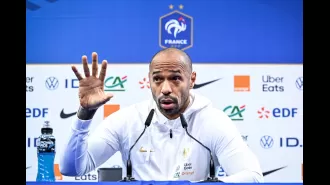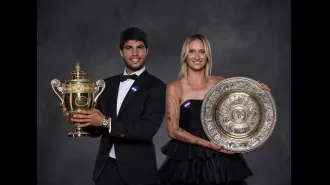I won't wash my husband's laundry, only mine and my kids' clothes.
They have different laundry and closet spaces.
July 29th 2024.

To do laundry or not to do laundry, that is the question that has sparked a heated debate on the internet. Abby Yeckel, a proud feminist and mother, recently shared on TikTok that she does not do her husband's laundry. In fact, she even splits the children's laundry with her partner to ensure equality in their household tasks. Her reasoning? She doesn't want to be seen as her husband's mother.
Abby explained her stance on TikTok, stating that she and her husband each have enough clothes to wash their own loads separately. She also expressed her hesitation about her husband possibly mishandling her laundry or not paying attention to specific drying instructions. Abby believes that in many relationships, women automatically assume the role of the primary caregiver and homemaker, leading to an unequal distribution of household tasks.
She advises other women to have a conversation with their partners about an equitable breakdown of domestic labor before taking on these tasks. This way, it doesn't become expected of them and they don't end up carrying the majority of the burden. Abby's message resonated with many, as a UK study found that 72% of women say they do the majority of household tasks, with women spending an average of 36 hours per week on household chores.
However, not everyone agrees with Abby's approach. Some argue that it is natural for couples to help each other out with household tasks, including laundry. They suggest taking turns or just doing each other's laundry to make things easier. Others see Abby's perspective as an obsession with equity and claim that it leads to a transactional marriage.
Despite the division of opinions, Abby's concerns about the unfair division of labor in relationships are valid. Relationship coach Gemma Nice believes that many women are trapped in the role of the primary caregiver, even though both partners work and contribute to the household. This can be exhausting and can lead to resentment towards their partners.
In the end, whether a wife should do her husband's laundry is a personal decision that each couple must make for themselves. Abby's advice is simply to start out as you mean to go on and have a conversation with your partner about an equitable distribution of domestic tasks. This way, both partners can contribute to running the household and avoid any potential resentment in the future.
Abby Yeckel, a self-proclaimed feminist mother and wife, sparked controversy on TikTok when she proudly shared that she does not do her husband's laundry. While this may seem like a mundane household task, the internet was quick to react and debate the issue of domestic labor equality within relationships.
Abby explained that she splits the laundry duties with her partner, believing in an equitable breakdown of domestic tasks. She also shared that she doesn't want to fall into the trap of "mothering" her husband, a common dynamic in many relationships where women take on the majority of domestic labor tasks.
Abby's stance is not unfounded, as a UK study found that 72% of women say they do the majority of household tasks, with women being five times more likely to be tasked with cleaning and tidying than men. Abby's advice to start out as you mean to go on and have a conversation about an equal division of labor before doing domestic tasks for a partner is a wise one.
However, not everyone agrees with Abby's approach. Some argue that it's strange not to do each other's laundry in a relationship, while others dismiss it as an obsession with equity. But Abby's concerns about the unequal division of labor within relationships cannot be ignored.
Relationship coach Gemma Nice believes that many women are becoming trapped in a "mother" dynamic within their relationships, where they take on the majority of domestic labor tasks while also working and parenting. She emphasizes that running a household should be a shared responsibility between partners, rather than one person's job.
In conclusion, Abby's TikTok may have sparked a debate, but it also sheds light on a much larger issue of domestic labor equality within relationships. Whether you choose to do your partner's laundry or not, having open and honest conversations about the division of labor is crucial for a healthy and equal partnership.
Abby explained her stance on TikTok, stating that she and her husband each have enough clothes to wash their own loads separately. She also expressed her hesitation about her husband possibly mishandling her laundry or not paying attention to specific drying instructions. Abby believes that in many relationships, women automatically assume the role of the primary caregiver and homemaker, leading to an unequal distribution of household tasks.
She advises other women to have a conversation with their partners about an equitable breakdown of domestic labor before taking on these tasks. This way, it doesn't become expected of them and they don't end up carrying the majority of the burden. Abby's message resonated with many, as a UK study found that 72% of women say they do the majority of household tasks, with women spending an average of 36 hours per week on household chores.
However, not everyone agrees with Abby's approach. Some argue that it is natural for couples to help each other out with household tasks, including laundry. They suggest taking turns or just doing each other's laundry to make things easier. Others see Abby's perspective as an obsession with equity and claim that it leads to a transactional marriage.
Despite the division of opinions, Abby's concerns about the unfair division of labor in relationships are valid. Relationship coach Gemma Nice believes that many women are trapped in the role of the primary caregiver, even though both partners work and contribute to the household. This can be exhausting and can lead to resentment towards their partners.
In the end, whether a wife should do her husband's laundry is a personal decision that each couple must make for themselves. Abby's advice is simply to start out as you mean to go on and have a conversation with your partner about an equitable distribution of domestic tasks. This way, both partners can contribute to running the household and avoid any potential resentment in the future.
Abby Yeckel, a self-proclaimed feminist mother and wife, sparked controversy on TikTok when she proudly shared that she does not do her husband's laundry. While this may seem like a mundane household task, the internet was quick to react and debate the issue of domestic labor equality within relationships.
Abby explained that she splits the laundry duties with her partner, believing in an equitable breakdown of domestic tasks. She also shared that she doesn't want to fall into the trap of "mothering" her husband, a common dynamic in many relationships where women take on the majority of domestic labor tasks.
Abby's stance is not unfounded, as a UK study found that 72% of women say they do the majority of household tasks, with women being five times more likely to be tasked with cleaning and tidying than men. Abby's advice to start out as you mean to go on and have a conversation about an equal division of labor before doing domestic tasks for a partner is a wise one.
However, not everyone agrees with Abby's approach. Some argue that it's strange not to do each other's laundry in a relationship, while others dismiss it as an obsession with equity. But Abby's concerns about the unequal division of labor within relationships cannot be ignored.
Relationship coach Gemma Nice believes that many women are becoming trapped in a "mother" dynamic within their relationships, where they take on the majority of domestic labor tasks while also working and parenting. She emphasizes that running a household should be a shared responsibility between partners, rather than one person's job.
In conclusion, Abby's TikTok may have sparked a debate, but it also sheds light on a much larger issue of domestic labor equality within relationships. Whether you choose to do your partner's laundry or not, having open and honest conversations about the division of labor is crucial for a healthy and equal partnership.
[This article has been trending online recently and has been generated with AI. Your feed is customized.]
[Generative AI is experimental.]
0
0
Submit Comment





